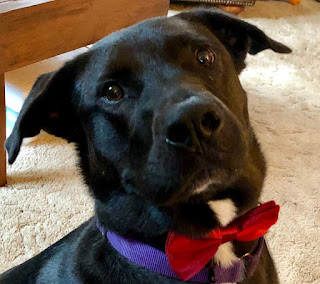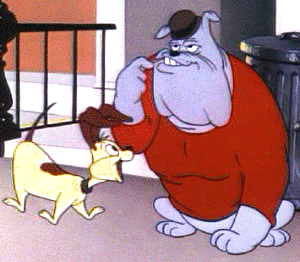The squirrel was just sitting there, shivering. It didn’t look cold, it looked more like it had a disorder of the central nervous system. Its entire body was vibrating, almost as if it were being subjected to periodic electric shocks.
Was this what rabies looked like? Then he glanced over at his window, which was closed.
So how had it gotten into his room?
Then he realized two other things, in increasing order of bizarreness. First, he didn’t feel at all alarmed by the fact that there was an apparently diseased squirrel in the middle of his bed, and second, the squirrel looked a lot like the way he had imagined his anxiety during hypnosis.
Without taking his eyes off the animal, he reached over and picked up his tennis racket, which was leaning against the wall behind the door. He walked slowly toward the bed, and then extended the racket, and poked the animal in the side with the end of it.
“Shoo,” he said.
The squirrel looked up at Jesse and said, in a high-pitched but perfectly clear voice, “Fuck off.”
Jesse dropped the racket.
“You talk?” Jesse said.
The squirrel just gave him a sour look, and its face twitched.
“Are you the animal I visualized when I was at the hypnotist?”
“Bright guy. Got it in one.”
A thought floated through his head, wondering why he wasn't freaking out about this. Any normal person would be beyond freaking out by this point. “How can you be real?”
“You did it,” the squirrel said, a bitter tone in its voice. “You figure it out.”
“I’m having a hallucination.”
“Suit yourself.”
“So, you really are real, then?”
“Look, I’m not going to spend my time discussing existential issues with you.” The squirrel looked up at him. “Say, you got some of those anti-anxiety meds you always pop like candy? I could use a couple.”
Jesse frowned. “Is this… is this why I feel so much better? Because you’re not inside me any more?”
“Oh, sure.” The squirrel's voice cracked as its body shook. “Lord it over me. Think about how I feel.”
“I’m sorry about that,” Jesse said, and then realized that he didn’t actually feel very sorry at all. “But you were the one making me upset, making it so I couldn’t cope.”
“Seriously? That’s what you think?” The squirrel snorted. “Try again, buster.”
Jesse sat down on the edge of the bed. “Well, whatever. I feel better, so I really don’t care if I’m hallucinating you or not. Now, move over, because I’m taking a nap. I feel like I could sleep for days.” He set his alarm clock for two hours. “But I still have to go to work, so I’d better just make it till eleven o’clock.”
***
Jesse woke up, after one of the soundest, most refreshing sleeps he could remember, just before his alarm went off. The squirrel had moved to the top of his bookcase, where it sat, shivering and glaring at him. Jesse changed into his work clothes, and twice had to stop himself from breaking into whistling. He did feel a twinge of guilt about the squirrel’s apparent discomfort, and didn’t want to rub it in its face too obviously.
While on a break at the library, he called Fay Devillier, and asked if she had any openings later in the week—that he felt so much better, he wanted to see her more than once a week. She sounded pleased, and surprised, but cautioned him against being too aggressive.
“Don’t push things too fast, Jesse. I’m happy you feel our work has been helpful, but slow and steady is best.”
“No, I really want to try this again. Can we?”
“I have an opening Thursday at ten. Can you make that?”
“Yes. And I know just what I want to work on.”
***
“Shyness is not necessarily a bad thing,” Fay said, at ten o’clock on Thursday morning. “What we think of as negative or unpleasant emotions can sometimes serve a purpose.”
“It’s a problem to me,” Jesse said. “I can’t face asking a girl out. I’m totally awkward at parties. I hate it.”
“Well…” She sounded hesitant. “If you find it to be that big an impediment to your life…”
“I do.”
***
When Jesse returned to his apartment, he was not really all that surprised to see that there was a little bird sitting on his dresser, which put its head under its wing when he looked at it. The squirrel was splayed out on its back on Jesse’s pillow, a cool, wet washcloth on its forehead, its body still wracked by tremors.
He barely gave them a glance. He went to his telephone and picked it up, and dialed a number he’d written on a slip of paper next to his nightstand.
“Hi, Sarah? This is Jesse Goldman—I’m Dale Warren’s roommate. I was wondering… would you like to go catch a movie or something tonight?”
***
Fay Devillier looked at Jesse doubtfully, as he walked into her office at ten o’clock sharp the following Tuesday.
“You look… good, Jesse,” she said tentatively.
“I feel great. Hey, I’ve already had two dates with Sarah. She’s great. I haven’t had a panic attack in over a week. I’m doing awesome.”
“That’s good. I mean… yeah, that’s good.” Fay paused and shook her head. “Look, I have to tell you that I have some misgivings about this. You seem like you’re… changing too fast. Like you’re imposing your will over your problems—forcing yourself to make big changes quickly. I’m worried that it won’t be permanent, that you could have a setback.”
“I’m not. And it’s not me imposing my will, or at least in the way you mean—that I’m somehow just submerging my feelings. Your hypnotherapy hasn’t made me able to control my bad feelings—it’s taken them away. I had therapy for years that was designed to help me control my feelings. It never worked. What you’ve helped me to do is to remove the feelings entirely.”
“Feelings aren’t bad things, in and of themselves,” Fay said. “I’m sorry if I gave you that impression. Feelings are there for a reason.”
“They’re making it too hard for me to do what I want to do.”
Fay looked at him uncertainly. “Are you sure…” she began, and then stopped.
“I’m sure. I want to do it again.”
She bit her lip. “Once more. Only once. And then you need to sit back, and let yourself just be for a while. The whole point of this isn’t to tear yourself apart, you know.”
“Maybe not. But I sure don’t mind tearing away the parts of me that cause me pain.”
Fay frowned at him, and then took a deep breath. “All right. One more time, then. What will it be this time?”
“Fear.”
***
Jesse caught only a glimpse of the rabbit’s white tail as it zoomed under the dresser when he walked into his bedroom at a little before noon.
The bird was standing in front of the mirror on his dresser, both wings over its eyes.
The squirrel had somehow opened the bottle of Southern Comfort Jesse had sitting on top of his bookcase, and lay next to a mostly-empty glass in an alcoholic stupor. It was still shivering.
This was awesome. No fear. No anxiety. No shyness.
Of course, there were other parts of him that he could sure do without. Wouldn’t it be nice not to be angry at his parents any more for all of the head trips they put on him when he was a kid? Wouldn’t it be great not to feel sad any more about his beloved grandma dying last year? Wouldn’t it be easier if he didn’t feel jealous of Dale for being better-looking than he was?
He lay back on his bed, and cupped his hands behind his head.
Fay said she wasn’t going to help him any more, that what he was doing was dangerous. But he didn’t feel afraid to do it, so what exactly was the problem? He peered over at the rabbit, which had poked its whiskered face out from under the dresser. As soon as he turned its way, it dashed back into the dark space and disappeared.
He closed his eyes. Focused on his breathing, made each breath deep and deliberate. He concentrated on the air moving in and out of his chest, felt his heart beating more slowly as relaxation seeped through his body.
Anger. Sadness. Jealousy. Pain. Loss. Grief. Rage. Laziness. Destructiveness. Greed.
How much better it would be, how much more peaceful and quiet and calm, without any of them.
Jesse Goldman sank back, descending, his awareness pulling one emotion, then another, then another, out into the sunlight for him to watch and then to banish, until finally there was nothing left, nothing but an empty beam of sunlight with only a few particles of dust swirling in it to give it substance.
***
Dale Warren got home from work at a little after seven. He dropped his lunchbox on the counter, chucked his keys onto the coffee table, then went over to check voicemail. He’d left a message with Rachel about going to a party that evening—a yes from her would make what had been an otherwise fairly boring day have at least the promise of a good end.
The voice on the only message, however, wasn’t Rachel’s. “This is Jessica McVeigh,” came a pinched, annoyed female voice. Dale recognized the name of Jesse’s boss at the library. “Jesse, where are you? Louise is sick today, and we’re short-handed. Call me when you get this.”
Dale frowned. Missing work without calling in wasn’t like Jesse. It wasn’t like him at
all. He went to Jesse’s bedroom, and knocked on the door.
“Yo, Goldman, you in there?”
There was no response, so Dale opened the door.
Jesse Goldman was lying on his bed, his hands still behind his head, a beatific smile on his face.
“Goldman?” Dale said, and walked over to the bed, and shook his roommate’s arm.
Jesse didn’t awaken, didn’t even stir. His chest still rose and fell, slowly, rhythmically, the only thing that showed that he was still alive.
And that was when Dale noticed that he and Jesse were not alone in the dimly-lit bedroom. In every corner, on every surface, there was an animal of some kind. A large snake was coiled around the base of Jesse’s floor lamp, its forked tongue flicking, watched him through lidless eyes. A monkey sat beside the bookcase, systematically tearing up one of Jesse’s old college chemistry textbooks. A basset hound, its long ears drooping, gazed at Dale for a moment, then gave a heartfelt sigh and curled up in a pile of dirty clothes on the floor next to the bed. A packrat was scurrying back and forth, picking up objects in its mouth, and bringing them back to pile them up in the corner by the window. It already had a small stack of coins, several paper clips, a flash drive, a keychain, and Jesse’s wristwatch. There were others animals there, too—he could make out several different kinds of birds, a frog, a scorpion, a lizard of some sort, and most alarmingly, what appeared to be a black panther, sitting inside the closet, looking out at Dale through the half-open door. As their eyes met it gave a low, throaty, dangerous-sounding growl, and Dale caught a glimpse of white teeth.
Dale backed toward the door, his heart jittering uncertainly against his ribs.
“Jesse?” he said again, his voice coming out as a squeak.
A squirrel raised its head from a spot on the bookcase, and regarded Dale through bloodshot eyes. “Don’t bother,” the squirrel said. “He can’t hear you. He thought he’d be better off this way. Moron.”
Dale turned and ran out of the room, and was dialing 911 when he heard the squirrel’s shrill voice call after him, “Don’t blame
me. I tried to tell him.”
I've mentioned before how fascinated I am with the parts of history that still are largely mysterious -- the top of the list being the European Dark Ages, between the fall of Rome and the re-consolidation of central government under people like Charlemagne and Alfred the Great. Not all that much was being written down in the interim, and much of the history we have comes from much later (such as History of the Kings of Britain, by Geoffrey of Monmouth, chronicling the events of the fourth through the eighth centuries C.E. -- but written in the twelfth century).
"Dark Ages," though, may be an unfair appellation, according to the new book Matthew Gabriele and David Perry called The Bright Ages: A New History of Medieval Europe. Gabriele and Perry look at what is known of those years, and their contention is that it wasn't the savage, ignorant hotbed of backwards superstition many of us picture, but a rich and complex world, including the majesty of Byzantium, the beauty and scientific advancements of Moorish Spain, and the artistic genius of the master illuminators found in just about every Christian abbey in Europe.
It's an interesting perspective. It certainly doesn't settle all the questions; we're still relying on a paucity of actual records, and the ones we have (Geoffrey's work being a case in point) sometimes being as full of legends, myths, and folk tales as they are of actual history. But The Bright Ages goes a long way toward dispelling the sense that medieval Europe was seven hundred years of nothing but human misery. It's a fascinating look at humanity's distant, and shadowed, past.
[Note: if you purchase this book using the image/link below, part of the proceeds goes to support Skeptophilia!]








.jpeg)








